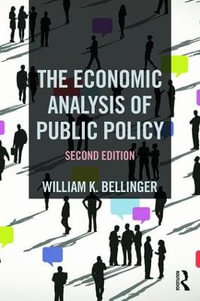"This book advances a social-theoretic treatment of public finance, which contrasts with the typical treatment of government as an agent of intervention into a market economy." "Richard Wagner's book will be of interest to researchers in public finance, public choice, Austrian economics, political science and public policy."--BOOK JACKET.
Industry Reviews
'Wagner brings remarkable scholarship to bear on elucidating the emergent approach and connecting it to the vast and varied public finance literature.' -- Brian Pitt, Review of Austrian Economics
'Richard Wagner's process-oriented analysis of the public sector offers an insightful alternative to standard public finance theory and a powerful critique of neoclassical welfare economics. His ideas will prove valuable to any scholar interested in understanding the economic activities of government.' -- Randall G. Holcombe, Florida State University, US
'Written by one of the premier scholars of fiscal process in the world, this book takes an approach that mixes common sense and a radical redefinition of the nature of fiscal process. Rather than an incremental advance in assessing taxing and spending, Richard Wagner opens new vistas by examining the foundations of collective activity. He rejects the standard treatment of fiscal management as a corrective to market failure, and starts with the first principles of government action. I don't know when I have learned more from a single book.' -- Michael Munger, Duke University, US
'This is a highly original and creative argument by a major political economist to rethink how the public economy is studied. Instead of treating the public sector as a corrective agency for problems that may arise in the private economy, Professor Wagner proposes to study the "public square" in the same way that modern economists approach the "private square". This involves eschewing equilibrium theories and emphasizing evolutionary competitive processes, examining property rights structures, stressing the role of entrepreneurship, and, in short, applying the principles of the New Institutional Economics to government. Wagner gives many convincing examples of how to apply his approach, all to good effect. This is an important book that deserves to be read widely and taken seriously. Learning the lessons that Wagner wants to teach us holds the promise of turning the study of public economics into a proper scientific explanation of government rather than an empty exercise in evaluation and intervention.'BR>- Robert D. Tollison, Clemson University, US
























